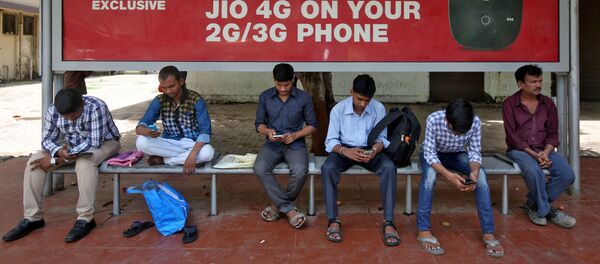TikTok's Chinese parent ByteDance, which has reportedly frozen hiring in India, is in talks with telcom giant Reliance Jio to sell its Indian business valued at over a whopping $3 billion, TechCrunch reported.
The two companies first initiated the discussions towards the end of last month, the publication reported on Thursday, citing anonymous sources familiar with the development.
The company, launched in 2015, was recently listed by US Secretary of State Mike Pompeo as a "clean telco" that has kept away from doing business with Chinese companies like Huawei. Hence, the news of it being in discussions with ByteDance to purchase TikTok's India business has spread like wildfire on social media.
Here is what "stunned" Indian netizens have to say about the potential Jio-TikTok deal.
First govt banned #tiktokban in India and now tiktok wants #MukeshAmbani to run the tiktok operations in India. I don't understand if #NarendraModi is the prime minister of India or #MukeshAmbani @PMOIndia @AmitShah @FarahKhanAli @ZeeBusiness @INCIndia @RahulGandhi
— Stand_for_truth (@udit749) August 13, 2020
Microsoft invests in Reliance Jio
— iShravn (@shraone_k) August 13, 2020
Microsoft looks to buy Tiktok
Tiktok in talks with Reliance
Everything is connected. Power and corporate more so. @Microsoft@reliancejio@tiktok_us #Dark #corporateshow #power pic.twitter.com/HYocCefUJb
TikTok Parent ByteDance in Early Talks With Reliance Industries to Invest in Video App: Report
— Mishu Goswami 🐼 (@mishuofficial1) August 13, 2020
LOL - TikTok company wants to Invest in Reliance Jio owner Mukesh Ambani in Video App #tiktok
They find a new way to enter again in India country after all 600 millions user base
Indian advertising revenue is too low, almost nothing in comparison to overall revenues. I think it will be a white elephant for Jio. pic.twitter.com/yCEemlOeLQ
— Leon (@profesnl) August 4, 2020
A startup should build a defensible moat and put distance between itself and the competition. I have not seen anyone do it better than Reliance #JIO. They're using their moat (unfettered access to Indian govt & regulators) to really scale their business #TikTok #WhatsApp
— Camera Obscura (@fintechnically) August 13, 2020
Speaking about the plausibility of the deal, senior tech analyst Achen Jhaker told Sputnik that TikTok’s future on markets outside China is clouded with privacy concerns, and so the task of bringing back user trust will be tough for any company that acquires it, be it software giant Microsoft, who is deliberating over purchasing TikTok’s global operations or Reliance Jio, who is reportedly interested in its India business.
"There are a handful companies in India that can offer the kind of capital required to buy TikTok operations. Even if Reliance Jio buys TikTok's India business – where the app had around 600 million users – it would be a monumental task to gain the faith of authorities as well as users", said Jhaker.
The news of Microsoft planning to buy TikTok’s operations in its global circles including India and Europe emerged after US President Donald Trump went on to list restrictions on the use of the video-making app on the phones of government employees, US military personal, the Department of Homeland Security, and the Transportation Security Administration.
Earlier in July, speculations of ByteDance considering refreshing TikTok’s corporate structure and making it an individual unit with a new official headquarters away from Beijing also surfaced.
The news came after India digitally struck China in June by first banning 59 Chinese apps including TikTok and the UC Browser, among others. The banning of Chinese apps has continued and now a total of 121 Chinese apps have been restricted from operating in India over security concerns.
The action against Chinese mobile apps comes against the backdrop of soured relations between the two Asian giants. India lost 20 soldiers in a violent clash with the Chinese People's Liberation Army on 15 June in the Ladakh region along the Line of Actual Control (LAC). The clash came after troops from both countries blamed each other of border intrusions.




